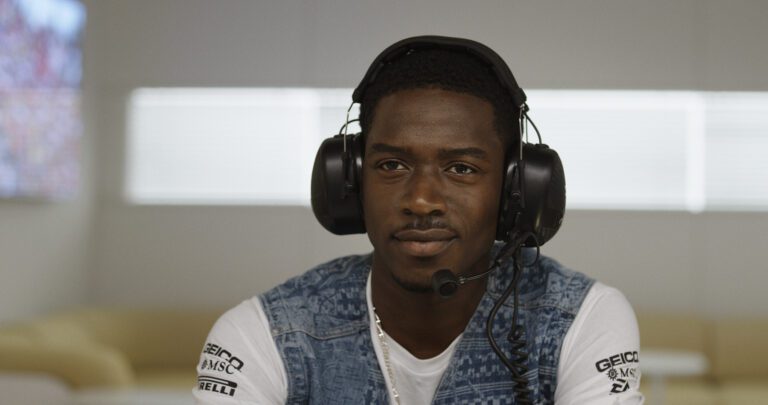It’s hard to choose just a handful of credits that cover the depth and breadth of Richard Hicks’ casting resume. From David Mackenzie’s Hell or High Water to Alfonso Cuarón’s Gravity to Larry David’s Curb Your Enthusiasm, he’s cast big titles in both film and TV. But for those who want to get to know the casting director behind the impressive resume, we’ve got you covered. Hicks made time to virtually sit down with Casting Networks and give insights into everything from how he works — including a window into casting the star-studded Apple TV+ series ROAR — to what he’d be doing if casting was not an option.
It’s great to virtually meet you, Richard, and I’d love to kick things off with the beginning of your career journey. When was the moment you knew that casting was the job for you?
There were a couple of moments, and I’ll share two. The first is from when I was an actor. I started being a reader for auditions and loved that — I was still getting to act, but it wasn’t my butt on the line. [Laughs] I was often self-conscious as an actor, but when the focus was on somebody else, it was a whole different experience. Anyway, I had that moment of realizing I really enjoyed being a part of the audition process. I loved being in the room when the casting directors were discussing the differences between everyone and figuring out which direction they wanted to go. Casting allows me to use more of myself more of the time than acting did. In other words, it utilizes both the creative and technical sides of my brain since a big part of casting is also figuring out how to problem-solve and get things done efficiently.
That makes sense. And what about the other moment?
A few years into casting, I was doing Curb Your Enthusiasm, and we were looking for an actor to play Larry David’s dad on the series. Shelley Berman came into the room, low-key as could be, which is notable considering he was one of America’s best improvisers. So, Shelley and Larry sit down — Larry would audition with everybody — and they just started improvising. One line after the other, they went back and forth, two masters of their craft at work right in front of us. It was incredible to watch, and I just felt so lucky to be in the room.
It sounds like it! Now jumping to present day and the recent release of ROAR, I have to ask how you assembled such an incredible cast for it. What can you tell us about the process, including how you found the right people for an anthology series that includes genres ranging all the way from horror to Western?
Let me start by saying that David Rubin and I cast this together. And our showrunners, Liz [Flahive] and Carly [Mensch], have this voice that served as a throughline between all the episodes. It’s this powerful, female-centered, and passionate voice that has a lot of anger and a lot of humor to it. And before David and I even came on the project, Nicole Kidman — who also executive produces the series — was already slated to star in one of the episodes. And I think that created an understanding of the quality level of the production, which in turn attracted others to the project. We needed actors with star power who could deal with complex material featuring magical realism and do it with a drive and energy that compelled you to watch. It’s a particular group of people who can do that, and for most of the parts, we aimed high. We wanted to see how high we could get, and we got some great ones!
With names like Cynthia Erivo, Issa Rae, Alison Brie, Betty Gilpin, Merritt Wever and Meera Syal on the ROAR cast list, I’d say you did!
But for the series’ Western installment, we went in the exact opposite direction of star names. That episode addresses how young women are not given a voice, and we wanted to cast people who were relatively unknown in the two main female roles. So, we opened the doors and auditioned hundreds of young actors in order to find the right people for those roles, which ended up being Fivel Stewart and Kara Hayward. That’s one thing I love about casting — you can be looking for famous Hollywood names or for actors who are not as known, but they can be just as impactful in their roles.
I love that. And now it’s time for my favorite question to ask casting. If someone made a film about your life story, which actor would you cast to play the role of Richard Hicks? Feel free to provide a few casting options.
Let’s see. I would say Ewan McGregor for his sly, self-confident charm and David Hyde Pierce for his wit and hairline. And then Ralph Fiennes is the inner me. He’s who I am on the inside. [Laughs] I mean, in my dreams, I’m the glowering, mega-star Ralph Fiennes.
Those are all fantastic choices! Switching gears here, it’s not every day that I get to talk with a former president of Casting Society. Can you share a memory from that experience with us?
Advocating for the casting community is something that’s very precious to me, which is an important part of that role. So since it connects, I’m going to share a related memory from back in 2005 when we organized casting directors in LA and New York to come together and stand up for ourselves. We were the only department heads at the time who weren’t represented by a union, even though we also deserved the healthcare, welfare, and pension benefits that come from being in a union. Producers ignored our call for change. I was a part of organizing the casting community to prepare to go on strike, which was a huge gamble for us. We have mortgages and kids and fears about paying the bills if we’re not working, just like everyone else. But, our goals were bigger than our fears. One night in January of 2004, tempers were high when the AMPTP (Alliance of Motion Picture and Television Producers) brushed us off yet again. Our negotiators let them know that they had to get back to the table or we were going to go on strike that very night. We’d successfully planned for that moment, and it took them by surprise. The producers came back to negotiate, and we worked out an agreement that allowed us to unionize.
Wow. That sounds like quite a moment!
There was this big meeting later that night with all the casting directors and associates in LA. We walked into the room and said to our colleagues, “There will be no strike.” There was 10 minutes of cheering, clapping, and crying because we’d done something everyone thought was impossible. Impossible — but we did it! Our community was able to unionize because of who we are and who we see ourselves to be when we stick together. It was beautiful.
Thank you for sharing such an impactful story, Richard. And before we wrap, I have to ask a fun, last get-to-know-you question. I’ll start by saying that you obviously have a passion for what you do and have seen much success as a casting director. But in a hypothetical situation in which you had to choose a different career, what would it be?
The answer to that question has changed over the years. Now, I would say that if I weren’t in casting, I would be a teacher or a politician or do something spiritual. I’ll say that as I’ve gotten older, I need less things and what matters more to me is what I’m going to leave behind.
From Hicks’ passion for his work to his passion for effecting positive change — and everything in between — this has been a window into the person behind all the casting credits. Those interested in learning more about the stacked list of film and TV titles on his resume can find them listed on IMDb.
—
This interview has been edited and condensed.













